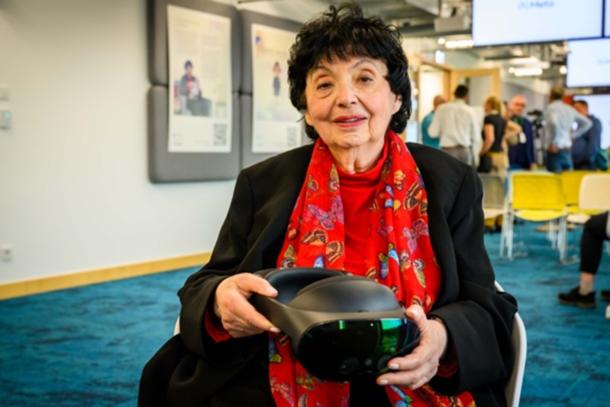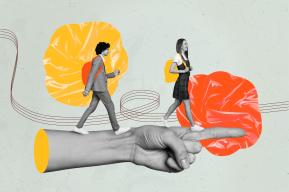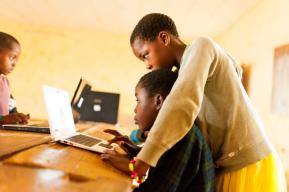Article
'It's my obligation to tell my story': Amplifying memories of Holocaust survivors with technology

“My life is a miracle, it's my obligation to tell my story,” says Inge Auerbacher, now 88, who faced the atrocities of the Holocaust when she was just seven. Having survived the Theresienstadt ghetto in the occupied Czechoslovakia, after the War she devoted herself to a lifelong mission of educating people about the dangers of intolerance and hate. She has since authored numerous books, poems, and music and delivered speeches at schools and universities. That was until she discovered what new technologies have to offer.
Wishing for her memories to live on, Inge decided to engage with the digital world in ways that would allow future generations to interact with her even when she'd no longer be around. Her story of suffering, resilience and hope was therefore brought to extended reality in a new education project, "Tell Me, Inge…", the result of a partnership between Meta, Storyfile, UNESCO, World Jewish Congress and the Claims Conference. This free online experience combines conversational artificial intelligence (AI) and virtual reality (VR). It recognizes users' speech and imitates a real-life interaction, allowing viewers to ask questions and listen to Inge's answers, accompanied by 360° multidimensional animated illustrations.
This project comes at a time when Holocaust remembrance is increasingly fragile. Almost 80 years after the end of the Second World War, surveys reveal significant knowledge gaps and indifference among younger generations. Despite being one of the most studied genocides in history, the facts about the Holocaust are still being denied and distorted, including online, where rising hate speech, disinformation and conspiracy theories often add fuel to the fire.
Providing global guidance to educate about the Holocaust
"Every day, there are fewer Holocaust survivors to recount their stories of enduring humanity's darkest chapter. As digital technologies rapidly advance, we must wield them thoughtfully and ethically and develop new tools that will help young generations better engage with the past,” says Karel Fracapane, Programme Specialist at UNESCO. “UNESCO is committed to honouring the victims of the Holocaust, passing on the survivors’ voices to future generations and promoting effective educational and remembrance policies. Through education, we can progress towards a society defined by peace, understanding, and respect for human dignity amidst hate and prejudice."
In this context, UNESCO leads global efforts to increase the relevance, quality and impact of Holocaust education worldwide. Innovative approaches like "Tell Me, Inge…" can serve as a springboard to equip learners with accurate historical information and deepen their understanding of hatred’s dynamics and consequences.
UNESCO supports educators and policy-makers globally in developing Holocaust and genocide education programmes through the International Programme on Holocaust and Genocide Education (IPHGE). Implemented jointly with the United States Holocaust Memorial Museum since 2015, the programme has benefited 24 countries globally and led to tailored education initiatives that resonate with local audiences and needs. They include developing education policy and teacher training, updating curricula and learning materials, awareness campaigns and other projects to deal with violent pasts through education.
Protecting history from attack online and offline
Memories of Holocaust survivors like Inge are under the constant threat of distortion and online hate. In the digital world, false or misleading information about the Holocaust spreads quicker than wildfire, amplifying antisemitic prejudice and stereotypes or, at worst, rehabilitating and justifying violent ideologies. To address this, UNESCO drives global dialogue with digital platforms and other stakeholders to increase transparency and accountability, fight conspiracies and hate speech, and build an online world that protects human rights. This work encompasses the following elements:
Developing guidelines for regulating digital platforms to deal with harmful content online while protecting the freedom of expression.
Promoting the ethical use of artificial intelligence (AI) and new technologies. For example, UNESCO is preparing a brief on using AI for Holocaust education.
Launching awareness-raising campaigns with international partners. Together with the World Jewish Congress, UNESCO has established the website AboutHolocaust.org, which provides fact-based answers to common questions about the history of the Holocaust in 19 languages. Digital platforms cross-reference this resource in search requests on the Holocaust and related keywords.
Learn more about UNESCO’s work:








